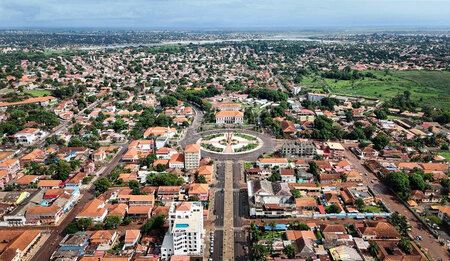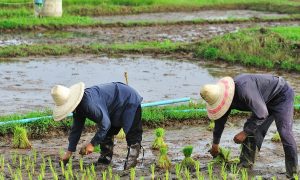Feature: Chinese expertise boosts rice yields, enhances agricultural cooperation in Guinea-Bissau

In Guinea-Bissau, Chinese agricultural expertise has quadrupled rice yields, boosting income for farmers like Acosdo. Since 1998, 230 Chinese experts have been stationed in Bafata, introducing high-yield rice varieties and techniques. Rice yields have increased from 1.4 to 4.9 tons per hectare, with demonstration areas reaching 8.5 tons per hectare. Planting areas have expanded from 60,000 to 100,000 hectares. China and Guinea-Bissau have agreed to enhance agricultural cooperation, accelerating the export of high-quality agricultural products like cashew nuts to China.
After a successful dry-season harvest in July, farmer Acosdo in Bafata, a town in the central-northern region of Guinea-Bissau, is getting ready for the upcoming planting phase.
Thanks to the meandering Geba River, Bafata has good conditions for the production of rice, an important agricultural crop for the country. However, rice yields had been low for long.
Acosdo said that with the help of Chinese agricultural expertise, things have changed. His production has quadrupled, boosting income and enabling him to buy essentials such as a new motorcycle and children’s clothing.
“Chinese experts brought seeds, pesticides, fertilizers, machinery, and technology, guiding me step by step in scientific rice cultivation, bringing new hope to our lives,” he said.
Chinese President Xi Jinping held talks with Umaro Sissoco Embalo, president of the Republic of Guinea-Bissau, in Beijing on Wednesday. During their meeting, President Xi expressed China’s willingness to continue supporting Guinea-Bissau’s domestic construction, sending rice experts and medical teams to assist in ensuring food security and developing public health.
Since 1998, the Chinese Agricultural Technical Assistance Team has been firmly established in the Bafata area, with over 230 experts dispatched.
The experts have been involved in selecting and cultivating high-yield rice varieties, demonstrating high-yield cultivation techniques, organizing training sessions on rice planting techniques, and providing agricultural machinery maintenance and repair training. Their efforts have helped local residents increase rice yields and secure their food supply.
Zheng Junjie, head of the 11th agricultural expert team stationed in Guinea-Bissau, said that the current team has introduced and selected a total of 37 rice varieties in the country. In three regions including Bafata, rice yields have increased from 1.4 tons per hectare to 4.9 tons per hectare. In demonstration areas, the average yield has reached 8.5 tons per hectare, with the highest yield reaching 10 tons per hectare.
Along with the increase in rice yields, rice planting areas in Guinea-Bissau have been expanded from 60,000 hectares to 100,000 hectares.
Antonio Tavares, head of Guinea-Bissau’s Rice Association, studied for nine years in China, earning a master’s degree in agronomy. “China’s agricultural cooperation introduced advanced technology and high-quality rice strains, markedly improving local farmers’ living standards,” he said.
Speaking of his years in China, Tavares recalled meeting rice hybrid pioneer Yuan Longping, an experience that shaped his advocacy for enhanced agricultural ties with China. “He was so friendly and approachable, personally going to the fields to demonstrate hybrid rice cultivation techniques,” he said.
In the Joint Statement on the Establishment of a Strategic Partnership between the People’s Republic of China and the Republic of Guinea-Bissau issued on Wednesday, both parties agreed to accelerate the export of high-quality agricultural products from Guinea-Bissau, such as cashew nuts, to China, while also exploring possibilities for local processing.
“We have long awaited this news,” said Mamadu Jamanca, president of the National Exporters Association. He said that local cashew nuts are of high quality and are a significant source of income for farmers and the country, but issues such as outdated processing technology and limited export channels often lead to low prices and sales difficulties.
Nevertheless, Guinea-Bissau’s cashew products have been well-received at the China International Import Expo, bringing hope to the people, Jamanca said. “We eagerly anticipate the vast Chinese market and hope that cooperation with Chinese companies can enhance the value of our products, promote the production chain, and benefit more local people.”
Source Link : https://english.news.cn/20240712/ec5fc171e08b4b11b7421e5196927918/c.html














